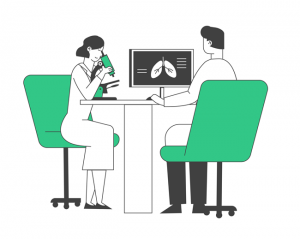
Can AI improve cancer detection and diagnosis?
Once an idea that existed only in science fiction, computers and artificial intelligence (AI) technology are now a part of our everyday lives. Many of you are reading this Shareable Science article on your smartphone that probably contains a handy AI personal assistant who can quickly answer your questions and keep up with your grocery lists. Personally, the AI assistant on my phone struggles with my Southern drawl so I’m hoping a future upgrade improves our ability to communicate with each other.
While most of us can appreciate that advanced technologies are wonderful for simplifying tasks in our daily lives, their potential applications are far more monumental. For example, scientists and clinicians have recently begun using AI programs to help make earlier and more accurate diagnoses for cancer.
Cancer screening and early detection
 Cancer was the second leading cause of death in the United States in 2019. Absent a cure, the most effective way to increase cancer survival rates is earlier detection of cancer when it is still localized in one spot and easier to treat. However, in many cases, by the time people notice symptoms of disease, the cancer may have begun to spread and be harder to treat.
Cancer was the second leading cause of death in the United States in 2019. Absent a cure, the most effective way to increase cancer survival rates is earlier detection of cancer when it is still localized in one spot and easier to treat. However, in many cases, by the time people notice symptoms of disease, the cancer may have begun to spread and be harder to treat.
Screening for cancer is designed to proactively monitor people without symptoms to catch disease early, when doctors have the best chance of treating it. The CDC currently supports screening for breast, cervical, colorectal, and lung cancers as recommended by the US Preventative Services Task Force.
While effective screening tests find cancer early and reduce the chance that someone who is screened will die from the cancer, there are several concerns with current screening tests. For example, minimally invasive screening tests, like those for cervical cancer and colon cancer, carry a possibility of bleeding or other health problems.
Inaccurate test results are also a major concern. A test that indicates a person has cancer when they do not, called a false-positive result, can cause unnecessary anxiety and subject the person to additional, unnecessary tests and procedures. On the other hand, false-negative results, which indicate a person with cancer does not have cancer, provide false reassurance and can lead to delays in diagnosis.
Improvements in the accuracy and sensitivity of cancer screening tests could help eliminate the concerns associated with current screening tests. Doctors and scientists have begun training AI applications to help them look for cancer in common screening tests.
Earlier detection of lung cancer
Lung cancer is the deadliest cancer in the world, with a five-year survival rate of only 21.7 percent. Screening for lung cancer in high-risk individuals is done annually using low-dose computerized tomography (CT) scans, a type of imaging that creates cross-sectional pictures of a person’s lungs. Early detection of small tumors confined to the lung increases a person’s chance of survival, with almost two-thirds of such people surviving for at least five years.
 Driven by the need for increased early detection programs but a lack of enough radiologists to ramp up such programs, researchers at Northwestern University’s Feinberg School of Medicine began training an AI system to find the early stages of lung cancer in CT scans.
Driven by the need for increased early detection programs but a lack of enough radiologists to ramp up such programs, researchers at Northwestern University’s Feinberg School of Medicine began training an AI system to find the early stages of lung cancer in CT scans.
To train the system, researchers used a database of more than 40,000 CT scans. In the beginning, the researchers told the computer which early-stage scans turned out to contain cancerous spots and which did not. Eventually, the computer learned what the cancerous tissue looked like and could flag early signs of cancer.
The system is so sensitive that it can detect small tumors around one to three millimeters in size about 95 percent of the time (the accuracy rate of radiologists is about 65 percent). For comparison, that is about the size of the tip of a pen.
Excitingly, when given old CT scans of people who later developed lung cancer, the system detected subtle changes in tissue that doctors could not see. In some cases, the AI detected cancer in scans taken two years before a doctor even detected the cancer.
Predicting breast cancer risk
The use of AI technology in cancer diagnosis is not limited to lung cancer. Doctors have begun using similar technology to analyze mammograms and identify women who are at high-risk for developing breast cancer.
A mammogram is an X-ray of the breast and is currently the best way to find breast cancer early. Current recommendations suggest that women aged 50 to 74 years old and are at average risk for breast cancer get a mammogram every two years.
During the COVID-19 pandemic, many women skipped screening mammograms due to local lockdowns or fear of the virus. Doctors at Massachusetts General Hospital were concerned by this gap in screening and thought ‘What if we could scan old mammograms to determine which women are at the highest risk of breast cancer and should be prioritized or nudged to come in for screening?’
 Enter AI. Doctors at Mass General began using an AI algorithm developed by scientists at Massachusetts Institute of Technology (MIT) to predict who has the most risk of developing cancer. Women flagged by the algorithm were three times as likely to develop cancer.
Enter AI. Doctors at Mass General began using an AI algorithm developed by scientists at Massachusetts Institute of Technology (MIT) to predict who has the most risk of developing cancer. Women flagged by the algorithm were three times as likely to develop cancer.
The AI algorithm, called Mirai, is much more accurate than statistical models normally used to judge a woman’s breast cancer risk. By analyzing historical patient data, the researchers found that Mirai flagged as high-risk 42 percent of people who went on to develop cancer in five years, compared with 23 percent for the best existing model.
This is not a “robots will replace you local doctor” type of story. Instead, artificial intelligence algorithms are helping doctors diagnose and predict disease. That kind of personal assistant brings enormous benefit – without needing to understand anyone’s regional accent!
Get the Latest Sharable Science Delivered Straight to Your Inbox!
[gravityform id=19 title=false description=false ajax=true]

